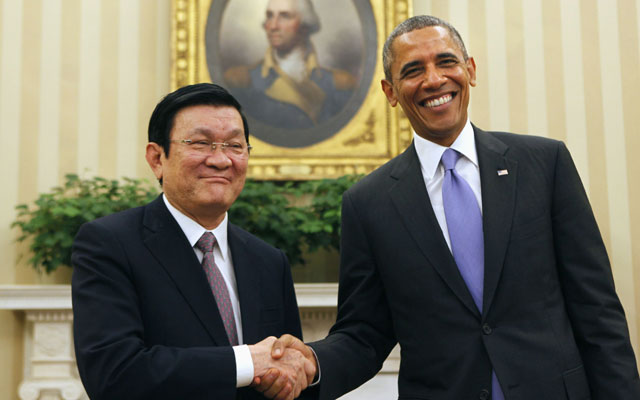
Vietnam’s President Troung Tan Sang in the Oval Office with President Obama. (Photo: YURI GRIPAS/REUTERS/Newscom)
Fact: When the United States negotiates trade agreements with countries that oppress their people, the opportunity exists to liberalize institutions and ultimately create political reform—provided we have leadership with the vision to do so.
Seeking economic growth, the government of Vietnam is slowly liberalizing key economic sectors. Vietnam’s inclusion in the Trans-Pacific Partnership (TPP) will further encourage the reform of conditions restraining development.
President Obama and Vietnamese President Troung Tan Sang’s joint commitment to completing the TPP by the end of the year is encouraging. Standards for the TPP should boost property rights and rule of law as well as financial and investment freedoms.
Guiding a trade agreement is not where the U.S. President’s job ends. Economic liberty may serve to enable political reform in Vietnam, ultimately doing more to advance the human rights situation in that nation than any number of meetings or photo ops.
But when the two leaders ended their meeting at the White House with remarks to reporters, President Obama included that “we discussed the fact that Ho Chi Minh was actually inspired by the U.S. Declaration of Independence and Constitution, and the words of Thomas Jefferson.”
If only that were true. It’s reading a bit more into history than is warranted. What matters most is not what a leader says but what he does and what his action inspires.
The reality is that millions of Ho Chi Minh’s countrymen—not to mention tens of thousands of American servicemen—died as the result of the war he launched on the south. And the suffering didn’t end with the end of the war. The government that Ho Chi Minh founded imprisoned more than a million in “re-education” camps after the war. For years thereafter, hundreds of thousands got onto unsafe boats to escape the oppression of their government. Many drowned. Still more now make up the worldwide Vietnamese diaspora.
Thomas Jefferson articulated universal rights in the Declaration of Independence. These universal rights are endowed by our Creator. Governments are supposed to protect them. President Sang has no more right today to determine what level of oppression his people will live under than Ho Chi Minh had the right to oppress his people in the first place.
Of all people, President Obama—the leader of the free world—should remain consistent and resolute in defense of universal, Jeffersonian rights, else others perceive any discussion of human rights as no more than American diplomatic protocol to be forgotten when the economic discussion is at hand.
Obama dropped the ball when he failed to distinguish between Ho Chi Minh and Jefferson. But perhaps the President has another chance. At the close of proceedings, Sang extended an invitation to Obama to visit Vietnam while still President.
The potential visit offers President Obama the opportunity to speak directly to the Vietnamese people, though he need not trash Ho Chi Minh in Hanoi. But rather than buying Vietnam’s long-discredited public diplomacy staple and promoting Ho Chi Minh as a progenitor of liberty the equivalent of Jefferson, he ought to discuss the example of the United States and how those truths Jefferson so eloquently championed led to the greatest prosperity ever seen on the planet. In this way, he can demonstrate the natural connection between American support for free trade with political liberty.
After all, Presidents have been able to inspire great things repeating facts like that.

























